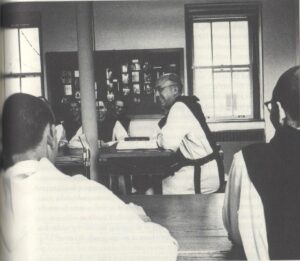In his talks to the novices on Christian Mysticism, (found in ‘An Introduction to Christian Mysticism’ edited by Patrick O’Connell) Thomas Merton sharing the writings of Maximus the Confessor emphasised that we are led to spiritual contemplation, which is a gift proceeding from love. Spiritual contemplation is not only the crown of the active life and the beginning of the contemplative life, but it also is necessary to complete the moral purification effected by the active life. This is both a transformation and a deepening, and it leads to a meaningful sense that leads us to experience the heart of things – Maximus uses the term ‘the logoi of things’. So, what might this mean?
Merton describes St. Maximus as the great doctor of theoria physike. He says:
‘The love of Christ hides itself mysteriously in the inner logoi of created things . . . totally and with all His plenitude . . . in all that is varied lies hidden He who is One and eternally identical; in all composite things, He who is simple and without parts; in those which have a beginning, He who has no beginning; in all the visible, [is] He who is invisible’.
Thomas Merton teaching the novices
There is then something – the essence of God’s love in every created thing. The term theoria physike is then about the reception of the mysterious, silent revelation of God in His cosmos and in the way everything works as well as in our own lives. This as I understand it, is then about the very reality of things. According to Maximus we are made to know God – it is natural and we need to be restored to this ‘natural’ contemplation of the cosmos. It is demanded as Merton explains to the novices by the cosmos itself and by history.
‘Theoria physike is a most important part of [our] cooperation in the spiritualization and restoration of the cosmos. It is by theoria that [we help] Christ to redeem the logoi of things and restore them in Himself.’
This theoria is inseparable from love and from a truly spiritual conduct of life. We have to see not only the inner meaning of things but then regulate our entire life and use of time and of created beings:
‘…according to the mysterious norms hidden in things by the Creator, or rather uttered by the Creator Himself in the bosom of His creation. The vision of theoria physike is essentially sophianic.’
Merton describes how it is possible to unite the hidden wisdom of God in created things with wisdom within ourselves and so we can become a mirror of the divine glory and life a life of divine truth. This is:
‘a sophianic, contemplative orientation of … life. No longer are we reduced to a purely negative attitude toward the world around us, toward history, toward the judgements of God. The world is no longer seen as merely material, hence as an obstacle that has to be grudgingly put up with. It is spiritual through and through. But grace has to work in and through us to enable us to carry out this real transformation.’
If we can awaken to this then everything becomes transfigured.
